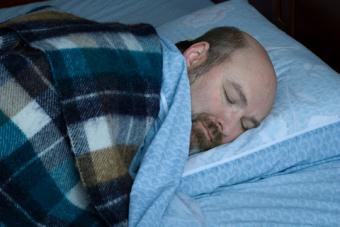
Although they are not really caused by a drug, sleep disorders can be triggered by drugs. Some drugs can also be used to treat sleep disorders.
Side Effects: Drug Sleep Disorders
The chemical reactions which cause a drug to be effective can also affect the body's sleeping mechanism. This means that:
- Some drugs can be purchased over the counter or prescribed to help a sleep disorder
- Other drugs can be prescribed for another physical problem; however, their side effect could be to trigger a sleep disorder
Many of these sleep effects have already been identified by the drug manufacturer. It is important for you to tell your doctor of any sleep disorders you have before you leave their office with the prescription. With that knowledge they can be sure to prescribe the best medication for you.
Drugs to Treat Sleep Disorders
Some sleep disorders such as sleep apnea, cannot be treated with drugs. Sleep apnea is best treated with a CPAP machine or BiPAP machine which will provide sufficient air pressure to keep the airways open during sleep.
Other sleep disorders such as insomnia, sleep deprivation, extreme sleepiness and restless leg syndrome can often be helped, or minimized with the use of a medication.
Insomnia and Sleep Deprivation
Until recently, sleeping pills could help a person get to sleep and stay asleep but they had several disadvantages:
- Addictive - After a while, an individual could no longer sleep without the aid of the medication.
- Diminishing effectiveness - The dosage had to increase over time to achieve the same level of sleep.
New formulations of sleep medications have been introduced that can help a person get to sleep faster, stay asleep and sleep for longer periods of time. The most common brands include:
- Ambien - Also called Zolpidem
- Sonata - Also called Zaleplon
- Lunesta - Also called Eszopiclone
- Rozerem - This medication mimics melatonin, the body's natural sleep promoting hormone
Some individuals don't require the long-term assistance with sleep such as that offered with Ambien or Lunesta. If they only are only having a short-term problem, some medications are formulated to offer sleeping assistance for seven to ten days. For example:
- Dalmane - Also called Flurazepam
- Doral - Also called Quazapam
- Halcion - Also called Triazolam
- Prosom - Also called Estazolam
- Restoril - Also called Temazepam
Extreme Sleepiness
Some individuals find it very difficult to stay awake and function throughout the daytime. They may be under treatment for narcolepsy or sleep apnea. Many of these individuals are prescribed Provigil, also called Modafinil.
Restless Leg Syndrome
People who cannot relax or stay asleep due to recurring symptoms of restless leg syndrome often find that Requip, also called Ropinirole, helps reduce the symptoms. This allows them to relax, fall asleep and stay sleep.
Drugs That Trigger Sleep Disorders
Some drugs may cause you to feel sleepy during the day or they might make it difficult for you to fall asleep at night. The impact on sleep is not the same for all drugs, nor is it the same for all individuals. If you have a sleep disorder, you should consult your physician before taking any drug.
Prescription Drugs
Prescription drugs that can cause insomnia include:
- Inhaled respiratory medications
- Diet pills
- Hormones
- Oral contraceptives
Prescription drugs that can cause sleepiness or insomnia include:
- Anti-depressants, anti-anxiety and anti-psychotic medications
- Blood pressure, cholesterol and heart medications
- Cancer medications and chemotherapy
- Parkinson medications
- Attention deficit/hyperactivity disorder medications
- Anabolic steroids and corticosteroids
Non-prescription Drugs
Non-prescription medications can also cause sleep problems. Medications that can make it difficult to go to sleep include:
- Medications with caffeine such as the brands Anacin, No-Doz and Excedrin
- Cough and cold medications with caffeine
Medications that can cause sleepiness or insomnia include:
- Cough, cold and flu medications without caffeine
- Pseudoephedrine, a chemical contained in the brand Sudafed
Illegal Drugs
Drugs such as cocaine, heroin, marijuana, amphetamines and methamphetamines cause wakefulness and insomnia.
Other Substances
Some everyday substances that you drink or smoke can also cause sleep problems:
- Coffee - The caffeine in coffee is a stimulant that can delay sleep or make it difficult to maintain sleep.
- Cigarettes and Cigars - Nicotine can disrupt sleep and can cause an individual to sleep for a shorter length of time.
- Alcohol - Drinking alcohol can cause a person to fall asleep. The sleep will be light and the individual may awaken frequently.
Talk to your Doctor
Drugs can be helpful or harmful for those with sleep disorders. They can also disrupt sleep. Always tell your doctor of any sleeping problems you are having before you walk out of the office with a prescription. You doctor can make sure that you are receiving a medication with minimal side effects to disrupt your sleep. Be sure to contact your doctor if you have drug sleep disorders after taking the prescription.







